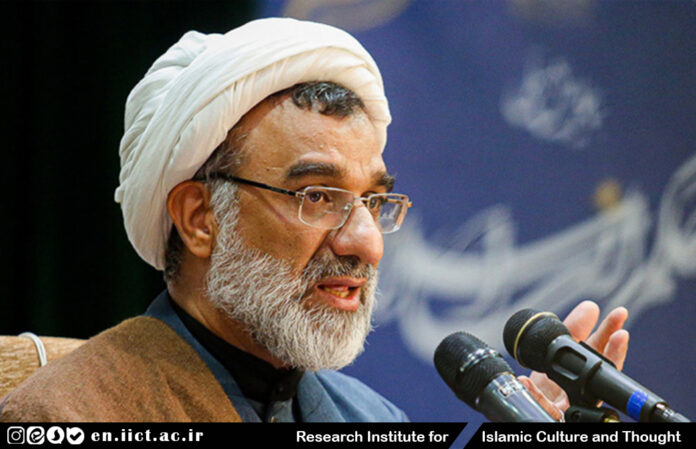According to the public relations report of the Institute of Islamic Culture and Thought, reflected by the Shabestan news agency, Hojjat al-Islam Wal-Muslimin Professor Abdul Hossein Khosropanah, at the National Conference on Islamic Governance held in the hall of Professor Mousaviyan of the Institute of Islamic Culture and Thought in Qom, stated: Governance means guiding processes and regulation, in other words regulation, monitoring and reforming.
The professor of Islamic Culture and Thought Research Institute stated: Governance is an eight-step process. For instance, in the field of defense, we have solid governance, but in the field of public culture, we either do not have governance or we are weak. He clarified: If we do not strive in the field of humanities and Islamic sciences, we will not be able to theorize in the field of Islamic governance. Different policies and documents have been written in the field of culture, which have not been taken into consideration regulation-wise. As an example, the ‘Islamic University Document’; It has been made, but we don’t have arrangements and regulations according to this document.
Hojjat al-Islam wal-Muslimin Khosrowpanah said: ‘Islamic rules’ should be the criterion in governance. Also, in forming governance in different categories, all Islamic sciences should be used, and all sciences should be considered. He also pointed out: We have had a successful governance in technological sciences; we have a ‘stem cell technology headquarters’ in the field of stem cells. Wherever we have had great achievements.
The secretary of the Supreme Council of Cultural Revolution said: Theories discover basic sciences, but ‘technical theories’ should be directly discovered. basic sciences are in the field of discovery, for example, Mendeleev’s table is a discovery, but we use this table for engineering technology, which consists of a soft and a hard field. He added: “Governance is a technology, and the reason why natural sciences and engineering are efficient is because they have grown into technology, and for this reason, since social sciences did not grow into technology, they did not have much success.”
Hojjat al-Islam wal-Muslimin Khosrowpanah stated: The principles of Islamic governance are the realization of freedom, justice and security. Because if they are not realized, we will be caught in routineness in all types of governance; including cultural, economic and social. He further added: Also, the maximum participation of the elites and the people is the second principle of Islamic governance, while some people insist on participation, but what they intend is only parties and the tribes.
The Secretary of the Supreme Council of the Cultural Revolution clarified: Maximum participation stems from the Wilayat (guardianship) and the unbreakable relationship of the Ummah with the Imam. All people, whether Shia or Sunni, are included in the circle of Wilayat, therefore ‘people of the book’ can also be included. He stated: One of the characteristics of the Wilayat is brotherhood, which includes three types: brothers in faith, Islamic brothers and humanitarian brotherhood. Also, jihadi management, accountability, transparency, and honesty are other principles of Islamic governance.
Hojjat-ul-Islam wal-Muslimeen Khosrupanah said: In Islamic governance, we should also pay special attention to the principle of “facilitation”, as well as “meritocracy”, “self-improvement”, “independence“ and “national honor”, and “civilization” are also important in Islamic governance.




